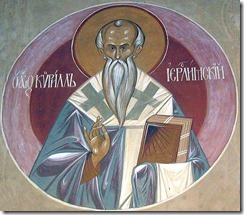 Cyril of Jerusalem (ca. 313 – 386) [taken from his “Catechetical Lectures” Lecture II]
Cyril of Jerusalem (ca. 313 – 386) [taken from his “Catechetical Lectures” Lecture II]
“A fearful thing is sin, and the sorest disease of the soul is transgression, secretly cutting its sinews of the soul, and becoming also the cause of eternal fire. Sin is an evil of man’s own choosing, an offspring of free will. That we sin of our own free will, the Prophet says plainly in a certain place: “Yet I planted you a fruitful vine, wholly true: how are you turned to bitterness, (and become) the strange vine?” (Jer 2:21 ) The planting was good, the fruit coming from the will is evil; and therefore the planter is blameless, but the vine shall be burnt with fire since it was planted for good, and bore fruit unto evil of its own will. For God, according to the Preacher, “made man upright, and they have themselves sought out many inventions.” (Eccles 7:29
) The planting was good, the fruit coming from the will is evil; and therefore the planter is blameless, but the vine shall be burnt with fire since it was planted for good, and bore fruit unto evil of its own will. For God, according to the Preacher, “made man upright, and they have themselves sought out many inventions.” (Eccles 7:29 ) For we are “His workmanship,” says the Apostle, “created unto good works, which God afore prepared, that we should walk in them.” (Eph 2:1
) For we are “His workmanship,” says the Apostle, “created unto good works, which God afore prepared, that we should walk in them.” (Eph 2:1 ) So then the Creator, being good, created for good works; but the creature turned of its own free will to wickedness. Sin then is, as we have said, a fearful evil, but not incurable; fearful for him who clings to it, but easy of cure for him who by repentance puts it from him. For suppose that a man is holding fire in his hand; as long as he holds fast the live coal he is sure to be burned, but should he put away the coal, he would have cast away the flame also with it. If however any one thinks that he is not being burned when sinning, to him the Scripture says, “Shall a man wrap up fire in his bosom, and not burn his clothes?” (Prov 6:27
) So then the Creator, being good, created for good works; but the creature turned of its own free will to wickedness. Sin then is, as we have said, a fearful evil, but not incurable; fearful for him who clings to it, but easy of cure for him who by repentance puts it from him. For suppose that a man is holding fire in his hand; as long as he holds fast the live coal he is sure to be burned, but should he put away the coal, he would have cast away the flame also with it. If however any one thinks that he is not being burned when sinning, to him the Scripture says, “Shall a man wrap up fire in his bosom, and not burn his clothes?” (Prov 6:27 ) For sin burns the sinews of the soul, and breaks the spiritual bones of the mind, and darkens the light of the heart.
) For sin burns the sinews of the soul, and breaks the spiritual bones of the mind, and darkens the light of the heart.
But some one will say, What can sin be? Is it a living thing? Is it an angel? Is it a demon? What is this which works within us? It is not an enemy, O man, that assails you from without, but an evil shoot growing up out of yourself. Look the right way with your eyes, and there is no lust. Keep your own, and seize not the things of others, and robbery has ceased. Remember the Judgment, and neither fornication, nor adultery, nor murder, nor any transgression of the law shall prevail over you. But whenever you forget God, immediately you begin to devise wickedness and to commit iniquity.
Yet you are not the sole author of the evil, but there is also another most wicked prompter, the devil. He indeed suggests, but does not get the mastery by force over those who do not consent. Therefore the Preacher says, “If the spirit of him that has power rise up against you, quit not your place.” (Eccles 10:4 ) Shut your door, and put him far from you, and he shall not hurt you. But if you indifferently admit the thought of lust, it strikes root in you by its suggestions, and takes your mind captive, and drags you down into a pit of evils.
) Shut your door, and put him far from you, and he shall not hurt you. But if you indifferently admit the thought of lust, it strikes root in you by its suggestions, and takes your mind captive, and drags you down into a pit of evils.
But perhaps you say, I am a believer, and lust cannot overcome me, even if I think upon it frequently. Do you not know that a root breaks even a rock by long persistence? Admit not the seed of evil, since it will break up your faith. Tear out the evil by the root before it blossoms, lest from being careless at the beginning you have afterwards to look for axes and fire. When your eyes begin to be diseased, get them cured in good time, lest you become blind, and then have to seek the physician.
Leave a Reply
You must be logged in to post a comment.